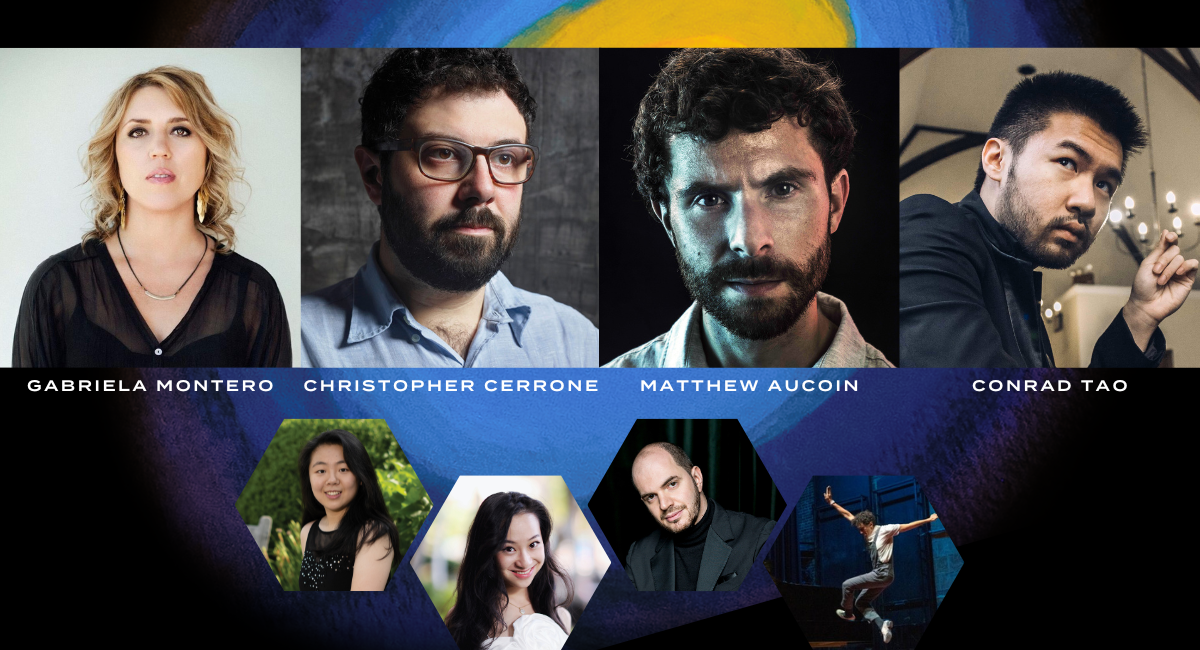New Gilmore Commissions Coming to the Festival
March 8, 2024

Supporting the creation of new music is a vital component of our mission, and to date, 45 new works for piano have been composed by 56 artists since 1991. Four of these compelling compositions will be performed here at the 2024 Piano Festival.
The first premiere will be Conrad Tao and dancer Caleb Teicher; they will perform a dozen pieces on Sunday, April 28 at 2 pm, in a program titled Counterpoint. These include the world premiere of a work composed by Tao, who shared with us some thoughts on the as yet untitled piece.
“This new piece builds on prior collaborative and co-compositional experiences in which we’ve found the most pleasure. The composition’s starting point is a phrasal and rhythmic structure that we initially used as an improvising springboard in our earliest duo performances. The sound palette is soft and subtle – leather-soled shoes, body percussion, twinkling chords that twist and evolve. The pace is similarly gentle, building out of even-keeled eighth note patterns. Lyricism, a priority since our first major collaboration together, 2019’s More Forever, remains a focus. We’re both percussionists in a way – albeit on instruments with very different tones and timbres – and finding lyrical continuity in our instruments, between our sounds, a continuity that might technically always be illusory, is a shared obsession.”
On Wednesday, May 1, 2024 Gilmore Young Artists Kasey Shao and Harmony Zhu will perform a new work by Christopher Cerrone at the beautiful Stetson Chapel. Ms. Shao will play Bach’s Partita 5, and Liszt’s Faust Waltz, and Ms. Zhu will play Chopin’s F Minor Fantasie and Kapustin’s Variations Op. 41. Together, the two will perform two movements from Prokofiev’s Cinderella Suite, Dvorak’s Slavonic Dances for piano four hands, a world premiere and Gilmore commission of a work by Christopher Cerrone, Uncanny Valley.
Here for several days during the Festival, Gabriela Montero will perform in recital and with the Calidore String Quartet. The latter will include her new work, Canaima: A Quintet for Piano and Strings. Ms. Montero provided program notes for the piece, which spotlights her environmental concerns for her home country of Venezuela, specifically the destructive encroachment on Canaima National Park of the mining industry, which has negatively impacted the lives and livelihoods of indigenous people.
“The first movement … opens with a quotation from an indigenous Jivi song… which provides the leitmotif for an elegiac homage to the region and its indigenous people…a light, but ambiguous second movement Scherzo suggests…both innocence – a people as-yet undisturbed by the outside world, untouched by dark forces – and the ritual, repetitive processes of cooperative work necessary for group survival. The contemplative third movement evokes the timelessness of the majestic Tepui – house of the Gods to the indigenous Pemón people – a table-top mountain formation that dominates the geological character of the Gran Sabana, and Canaima National Park in particular. We are reminded of the sacred dominion and permanence of nature in one of the world’s most ancient landscapes.
Human encroachment dominates the chaotic and violent fourth movement ostinato, as order is disrupted and brutalized. It serves as a clarion call for both acknowledgment and action in one of the planet’s most bio-diverse regions, a remote region that has fallen victim to the politically-expedient prioritization of other, competing ecological and political crises.
Rescheduled from 2022, Matthew Aucoin’s composition The tracks have vanished will be part of 2010 Gilmore Artist Kirill Gerstein’s recital on May 10, which will be livestreamed. Best of all, Matthew Aucoin will talk about his work in a concert preview before the 2 pm concert. His program notes share some insights on Mr. Aucoin’s process of creating the piece.
“Plenty of composers have written transcriptions of operas for solo piano, whether their own operas or those by other composers: think of Liszt’s virtuosic fantasias on the works of Bellini, Verdi, and Wagner; or, in more recent years, Thomas Adès’s playful “paraphrases” on his own operas. The tracks have vanished is something different: it is a transcription from an imaginary opera – or rather, a still-unwritten one. I have become fascinated in recent years by Dostoevsky’s prophetic novel Demons (which is still better known in English as The Possessed – an old and inaccurate translation of its title). Demons tells a story that feels all too relevant today: it’s a tale of the rise of nihilism within a complacent and unsuspecting society. Specifically, it deals with the way that the spiritual malaise of young, privileged, bored, lost young men can have deadly consequences.
Normally, when I write instrumental music, I don’t think in explicitly dramatic terms; the musical materials themselves contain plenty of drama! But in this case, unusually, I did start from specific images and moments within the story. The work is cast in two movements. The first is inspired, broadly speaking, by the dynamic between the two tormented young nihilists at the novel’s center. There is also a hidden little setting of Pushkin’s poem “Demons,” which serves as the novel’s epigraph: “Upon my life the tracks have vanished / We’ve lost our way, what shall we do?” The second movement was initially inspired by a chapter – suppressed by a censor in Dostoevsky’s lifetime – in which one of the protagonists visits a monk and confesses to having cruelly taken advantage of a young girl years earlier.
But here’s the thing: music is music, and none of these dramatic ideas served as more than an initiating impulse. Just as Beethoven once said that the metronome markings in his scores were only valid for the first few bars, the narrative inspiration for each of these movements only proved to be valid for the first few bars. After that, the music had its own ideas.”
Check your calendar and buy your tickets today to hear these works for the first time!
